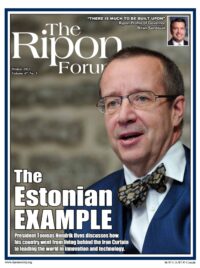When people talk about the next Silicon Valley, they often mention places such as Seattle, Washington, the area in and around Austin, Texas, or perhaps the Research Triangle by Raleigh-Durham, North Carolina.
And yet according to many technology experts, the next Silicon Valley is not in America at all. It’s in Estonia, where a former Radio Free Europe journalist who was raised in New Jersey and educated in the Ivy League has helped turn the former Soviet state into one of the most innovative countries in the world.
His name is Toomas Hendrik Ilves. Serving his second term as Estonia’s President, he spoke with THE RIPON FORUM recently about his efforts to transform the small Baltic nation into a major high-tech powerhouse. Among other things, Ilves discusses how these efforts were inspired in part by his 8th grade math teacher in America, and how they are being received by the Estonian people today.
Because of these efforts, Ilves was named one of 2012’s 20 Most Innovative People in Democracy by the TechCrunch blog. In naming him to this list, TechCrunch said that Ilves “presides over the most technologically advanced democracy on Earth.” Also on the list was Congressman Darrell Issa, the Chairman of the Government Reform and Oversight Committee and a lawmaker who is trying to do to the U.S. government what Ilves has done to the government of Estonia – make it more transparent and efficient.
Issa writes about these efforts in an essay for this edition. In his essay, Issa not only notes that “Federal agencies spend 70-80 percent of their IT budgets maintaining outdated systems,” but puts forward a number of reforms designed to “bring our analog government into the digital age.”
Also included in this latest edition of the FORUM is an op-ed by Northwestern Law Professor John O. McGinnis on “Accelerating Democracy,” and how the power of computers can be used to better predict the impact of policy decisions down the road. In addition, scholar and author Vivek Wadhwa, who first wrote for the FORUM in 2007, returns to our pages with a compelling argument about the connection between innovation and immigrant entrepreneurs and how, because of our outdated visa laws, the U.S. is letting this incredible source of talent slip away.
This edition of the FORUM also includes coverage of a panel discussion on the changing American electorate that took place at The Ripon Society’s 3rd Annual Legislative and Communications Directors Symposium on Leadership at Mount Vernon on February 8th. And in the latest Ripon Profile, Nevada Governor Brian Sandoval reveals what has surprised him most about the job and what Republicans need to do to expand their constituency and broaden their base.
As always, we hope you enjoy this edition of the FORUM, and encourage you to contact us with any thoughts, comments or questions you may have.
Lou Zickar
Editor
The Ripon Forum
louzickar@riponsociety.org




